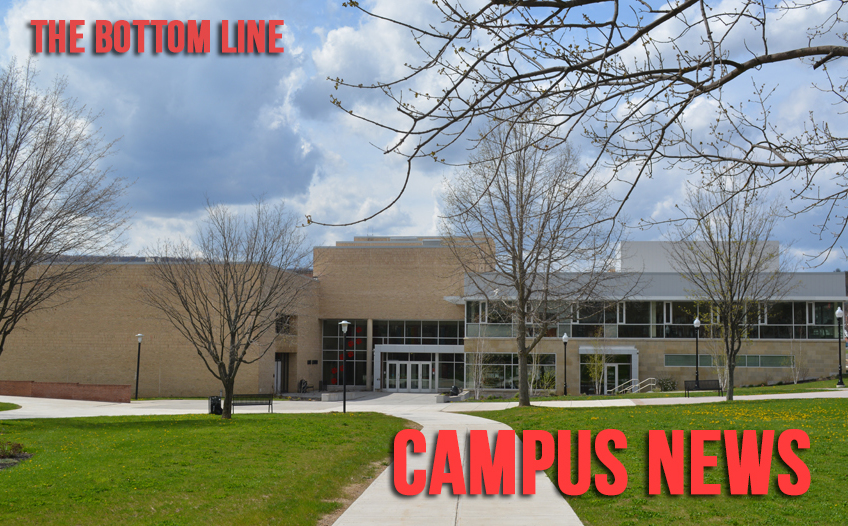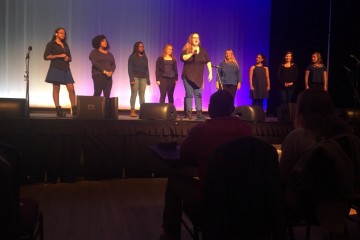Title IX Investigation Brings Changes to Frostburg State University [Update]
On Thursday, Feb. 19, University President Johnathan Gibralter spoke in front of the House of Representatives’ Appropriations, Education, and Economic Development Subcommittee on behalf of Frostburg State University. Gibralter explained the new steps the school is taking to ensure compliance with Title IX requirements.
Beginning last spring semester, Frostburg State University has been under scrutiny from the Department of Education’s Office of Civil Rights (OCR) for the way sexual assault accusations are handled by the administration.
OCR became involved when FSU alumna Jerica Bennett filed an official complaint with the Department of Education. According to the original Bottom Line report, “[Bennett] was sexually assaulted by another FSU student at a ‘get-together’ that took place at a friend’s off-campus house during the early hours of the morning of February 27, 2013. Later that morning, her friend escorted her to Western Maryland Regional Health System where a sexual assault forensic examination was conducted.” Bennett’s complaint is rooted in the university’s lack of communication with her and her various organizations and professors after reporting her traumatic experience. Bennett was forced to take exterior legal action to bring her attacker to justice as well as require the individual to cease contact with her.
Bennett insisted that the only people who helped her through her situation were University Police Chief Cynthia Smith and her lieutenants, whom she contacted on April 19, 2013. When asked about the university police’s actions in regards to sexual assault reports, Smith replied “Our first priority in assisting a victim of sexual assault is to encourage the victim to seek medical and psychological care and support. Sexual Assault is a violent act that can and often does have long-term impact. We know that it is important to engage a victim with appropriate support services as soon as possible to mitigate the negative effects to the extent possible.”
Bennett’s dissatisfaction with the school’s disciplinary actions and their (lack of) enforcement led her to seek federal action after graduating in May 2013.
Officials from the OCR created focus groups and conducted interviews in the spring of 2014 and have yet to rule on Frostburg’s compliance with Title IX.
The President’s Advisory Council Against Gender-Based Violence (PACAGBV) was formed on the Frostburg campus in 2011, replacing the Council Against Sexual Assault. According to their mission statement, the goal of this council is to “make recommendations to the President to assist in the campus-wide effort to educate students, faculty, and staff about the issue of gender-based violence and related programming, policies, and services.”
The Council’s website is host to a myriad of resources for the victims of gender-based violence, sexual assault, and dating violence. From recognizing the signs of violence as a bystander to support for victims, and ways to report the crime, the site — and its resources– is a step in the right direction for Frostburg.
One of Bennett’s complaints was her claim that she received no offers of counseling services for victims — or even a mere pamphlet– during her ordeal. The brochures published by the PACAGBV are now widely available on campus as well as instantly through their website.
The website also features tools for immediate assistance as well as different means of determining if a situation has the potential to escalate into a larger issue. Through the site, students can email a vague, but present “team of experts” for opinions on how to deal with their current uncomfortable situation.
PACAGBV is also the sponsor of “FSU Safe Zone,” a program implemented to support the LGBTQ community. Many staff members are Safe Zone certified, and their goal is to create an “open campus climate that is safe, accepting, and just” for all members of the community. The main action of Safe Zone members is to speak out against homophobia and heterosexism. There have been no scheduled Safe Zone trainings in the 2014-2015 school year.
According to President Gibralter’s testimony, PACAGBV has organized a “campus-wide climate survey” that will take place later this semester; however, there is no indication on their website of the council’s plan to sponsor any events. According to a committee member, the project is still “in the works,” and should be administered to students by the end of the semester if all goes according to plan.
“In addition,” President Gibralter explained to the subcommittee, “we plan to implement a dating violence prevention workshop that reinforces our current student bystander intervention program, further empowering students to intervene when there are warning signs of danger.” This workshop, like the survey, has not been indicated on any calendars as an upcoming event.
According to Emily Caputo, newly appointed Title IX Coordinator, this workshop will not be in effect until Fall 2015. The One Love Foundation –the creator of this workshop— is scheduled to come to campus to screen the workshop and train facilitators this semester in order to implement the workshop in the fall.
Part of Frostburg’s attempt to ensure compliance with the Campus Save Act — whose standards must be met by July 1– was the hiring of Caputo as Title IX Compliance Coordinator.
Caputo, an FSU alumna, previously served as the President of the Frostburg Alumni Association when she attended the school until 1999. Caputo’s last position was held at United Educators as Risk Management Counsel and Training.
“I saw a need here for Frostburg, and I’m an alum, so I wanted to help. I mean, this is an area that I’ve been working on for a long time, so it just kind of made sense,” said Caputo, explaining her decision to leave UE for FSU.
Samantha Hammett, a senior at FSU, is excited about the presence of a Title IX coordinator on campus. “Hiring Emily Caputo was great,” Hammett said. “I’ve had a lot of in-depth conversations with her where I’ve had faith. That’s the first time I’ve felt that from someone in a position to make a difference in a long time. Hammett is local activist and member of both PCAGBV and the BURG Peer Education Network as well as a survivor of sexual assault. “There are people on this campus who are trying,” Hammett said. “Those who are trying aren’t in power.”
Other key findings of the study include the following:
– More than three-fourths (78%) of the claims involved alcohol.
– The most vulnerable students were in their first and second year of college. These students represented 73% of the victims of sexual assault.
– For varying reasons, 40% of the victims delayed reporting their assault by an average of 11.3 months.
– The college or university investigated or adjudicated 77% of the claims reported. Of those investigated or adjudicated, findings of responsibility were common. Of those not investigated or adjudicated, the principal reason was because the victim did not want to proceed.
While working with UE, Caputo conducted research on sexual assault in higher education. Recently, her research was published on the organization’s website.
Her report states that “when responsibility was found, the institution imposed the following sanctions against perpetrators: 43% were expelled and 39% were suspended.” This leaves 18% of identified perpetrators unaccounted for.
When Caputo was hired, it was reported that she would provide Title IX training for faculty, staff, and students, but these initiatives have not received any further attention as of yet.
In fact, no policy changes have been implemented by Caputo since her installment at the beginning of the spring 2015 semester. “It’s a process,” Caputo explained. “It takes a while, in the sense of trying to decide what is going to work for our campus community.”
Beth Hoffman, previous Title IX Coordinator, was an active member of the PACAGBV, but Caputo has yet to attend a meeting of the council due to scheduling conflicts.
Caputo made it quite clear that her intentions at Frostburg are to encourage victims to come forward. She explained that when she came here to interview for the position she met with a group of students that voiced their concerns that their reports would not be taken seriously.
“I had an amazing experience as a student here at Frostburg,” Caputo said. “I mean, I love this institution, and it pains me to hear that students don’t feel comfortable coming to, you know, administrators to report something that’s very traumatic that occurred to them. So I guess I’m just hoping that I can change the culture that, you know, more people will want to come forward once they see that we will hear them and we’ll take their reports seriously.”





5 Comments